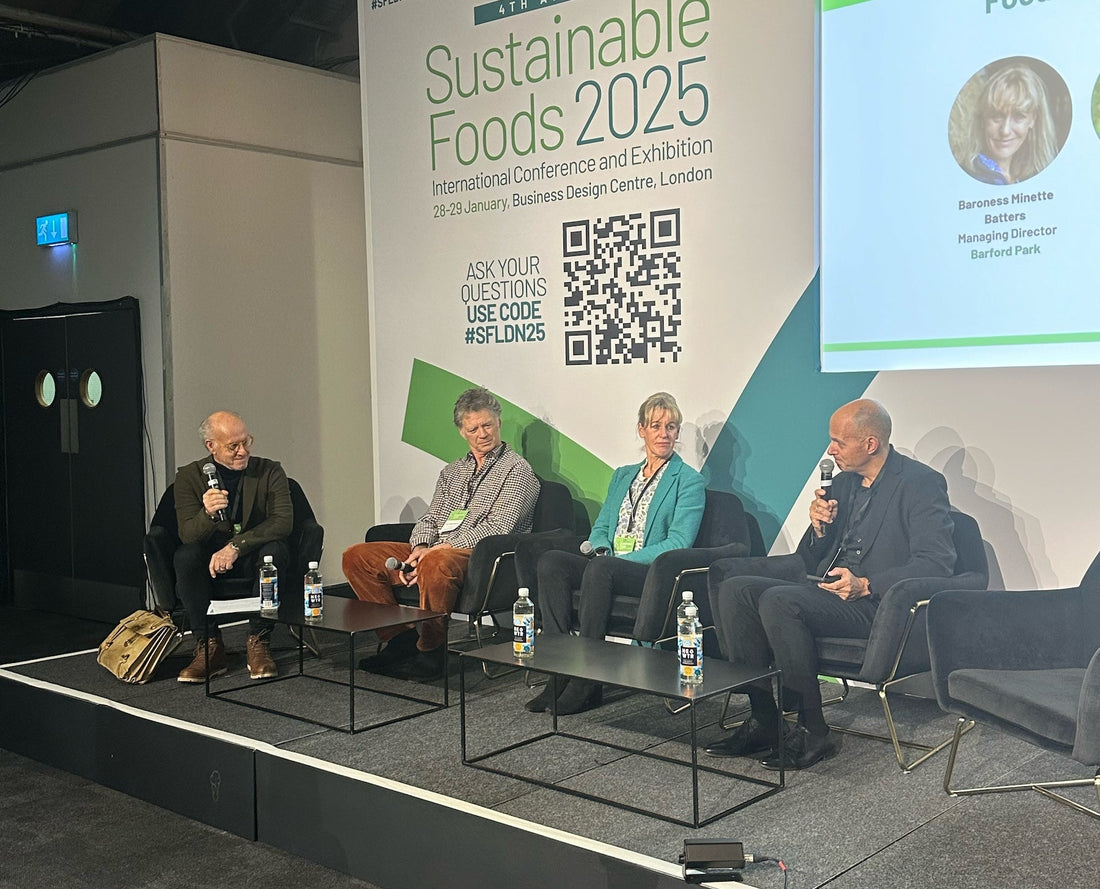On January 28th, I had the privilege of leading a distinguished panel at the Sustainable Foods 2025 conference in London to discuss one of the most pressing issues facing our country: UK food security. Alongside Baroness Minette Batters, Guy Singh-Watson of Riverford, and Keith Packer, CEO of British Sugar, we debated the current state of food security and what steps can be taken to safeguard the future of our food supply.
The conversation was timely, as just two days later, on January 30th, Stephen Reed, the Minister for the Environment, published the government’s land use framework consultation. Key takeaways from the consultation include:
- A reduction of farmland by 9% outright by 2050.
- A further 5% of farmland will be deemed inefficient and removed.
- An additional 4% will be repurposed for trees.
This plan raises serious concerns. Why is our nation's food supply now ranked behind environmental concerns in terms of priority? Both food security and environmental sustainability are equally vital. With the axing of farmer grants by 75% and the looming inheritance tax challenges, the stability of the nation's food system has never seemed more in jeopardy.
At a minimum, one would have expected the government to present the much-anticipated UK Food Strategy alongside this land use framework. Yet, once again, the food and farming community is left with another blow. As an organic farmer with 22 years of experience, I wholeheartedly support the balancing of nature, soil health, and the production of healthy food. However, I am increasingly dismayed by how successive governments have failed to recognise the need for an integrated environmental and food policy. How can a report like this be produced without considering how we will feed the nation?
Immediate Actions the Government Should Take
1. Big Landowners and Farmland Use:
It is staggering that big landowners now manage 3% of the UK’s farmland, and the National Trust has proposed re-wilding 250,000 hectares. However, the government is aiming for 750,000 hectares! We all agree that this is a step too far. Instead, we should look at the example set by the Crown Estates, who are leading the way by working collaboratively with tenant farmers, rather than continuing the outdated feudal landlord/tenant system. The current rental system is broken, and the Crown Estates are introducing an environmental Farm Business Tenancy that promotes both food production and nature recovery. This initiative has been endorsed by the Tenant Farmers Association (TFA). Alongside this, the Crown Estates announced a £20 million Rural Environment Fund to help farming families transition and support on-farm diversification. The question is: Can the Crown Estates influence other large landowners to follow suit?
2. Government Food Strategy:
The government should expedite its promised £5 billion food strategy for farmers with the following priorities:
- Grants for all farmers growing vegetables and fruit in harmony with the environment.
- Electric energy rebates for environmental food-growing schemes.
- Simplify planning: Centralise large food production projects, enabling faster support and approvals, just as the government has done with housing.
- Loan schemes: Create low-cost, long-term loans for food and farming enterprises, supported by banks.
- Tax breaks: Offer tax incentives to investors in farming and food-based initiatives.
- Golf Courses: It should be mandatory for golf courses to plant fruit and nut trees between fairways.
- Inheritance Tax: The government needs to find a better solution for farmers than the current inheritance tax nightmare.
3. Supermarket Reform:
It's time for supermarkets to rethink their business model. A new system must be introduced where:
- Supermarkets reduce their margins by 5% on all British produce and increase margins by 5% on food imports.
- The middlemen — the distribution companies that take a 30% margin from farmers — must be eliminated. If delivery services like DPD can manage direct-to-consumer shipping, why can’t supermarkets create their own direct-from-farmer sourcing model, as Riverford does?
- Each supermarket should have a farm team working directly with their farm suppliers, not buyers solely incentivised to reduce prices.
- A dedicated supermarket fruit and veg development team should work alongside CEA experts and DEFRA to develop a priority UK-sourcing scheme.
- British labelling should be mandatory for British-grown produce, making it easier for consumers to make informed choices.
The Role of Consumers
But the responsibility doesn’t lie with government and corporations alone. As consumers, we have an important role to play. Are we really going to allow ourselves to become dependent on foreign imports subject to currency fluctuations and climate change-induced price hikes? It's time to advocate for British food! I urge the press to start a campaign encouraging us all to 'Back British Food'.
The sustainable food movement is not just about environmental change; it's about ensuring that our food systems remain resilient and able to feed the nation. We can no longer afford to ignore the delicate balance between food production and environmental sustainability.
This discussion is just the beginning of what must be a continued and urgent conversation. I look forward to working with all stakeholders—government, farmers, food producers, and consumers—to ensure a thriving, sustainable future for our food system.




